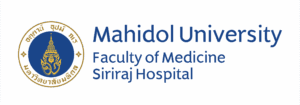Chief : Associate Professor Areesak Chotivichit, MD
Attending staffs :
Associate Professor Witchate Pichaisak, MD
Associate Professor Surin Thanapipatsiri, MD
Associate Professor Cholavech Chavasiri, MD
Assistant Professor Visit Vamvanij, MD
Associate Professor Chatupon Chotigavanichaya, MD
Monchai Ruangchainikom, MD
Sirichai Wilartratsami, MD
Assistant Professor Panya Luksanapruksa, MD
Ekkapoj Korwutthikulrangsri, MD
Honorary advisors :
Professor Emeritus Charoen Chotigavanich, MD
Clinical Professor Emeritus Amnuay Unnanuntana, MD
Introduction
The Spine Surgery Division has been a part of the Department of Orthopaedic Surgery for the past 17 years. Presently, there are 11
Clinical service
Spine surgery has been greatly advancing, both in surgical techniques and surgical materials/devices. For example, in surgery to correct Scoliosis, Titanium pedicle screw and rod are now used for surgical implant in place of Harington rod, and they not only help to correct the spine misalignment but also provide support for spine fusion. In 2003, we began to use micro-discectomy, which is a minimally invasive surgery technique using microscope, to operate on patients with lumbar herniated disc and pinched nerves. Later in 2005, we introduced micro-discectomy and micro-decompression spine surgery, where a small portion of the disc material is removed to relieve neural impingement and provide more room for the nerve to heal. These microscopic procedures result in less than 2 cm incision wound for each surgical site.
Recently in 2013, we started using computer navigation system as well as Nerve Monitoring System (NIMS) during surgery to increase surgical precision and increase safety for our patients.
Presently, we provide services to approximately 800-900 cases a year. With the continuing advancement in surgical techniques including improvement of existing techniques and development of new techniques, we are able to steadily increase the number of patients we serve. We are very proud to be the surgical team who had the greatest honor of performing spine surgery for His Majesty King Bhumibol Adulyadej during his stay at Siriraj Hospital.
Training
We have residency training program as well as fellowship training program, where we accept 2 fellows per year. To date, 19 fellows completed the program and they are now spine surgery experts at both University-affiliated hospitals and other large hospitals in the Ministry of Public Health. In addition, we offer opportunities for short term education and training for physicians from around the world. Our surgical training using cadavers (cadaveric workshop), organized in colllaboration with domestic and international surgical equipment suppliers, has received high interest and been attended by both physicians in Thailand and those from other countries.
Research interest
We conduct basic research such as investigating the use of stem cells to repair spinal cord injury and the use of bone marrow cells to repair spine. We also conduct clinical research on the use of small incision technique and navigator system for spinal surgery. In addition, we are interested in epidemiologic research to use findings to improve both direct patient care and public health service system.


